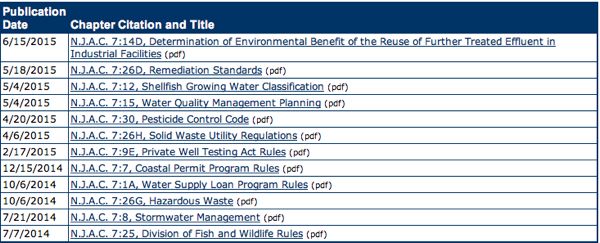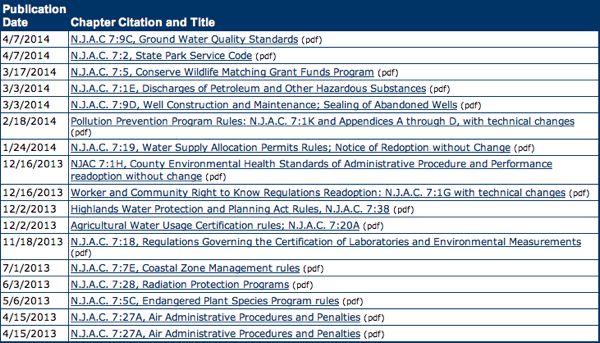Obscure NJ Law Ignores Science, Stifles Innovation, and Rewards Stagnation
Obstacle to Environmental Progress Part of Christie Red Tape “Reforms”
DEP Quietly Readopted 29 Regulations With No Change In The Last 2 Years
Legislators Urged To Hold Oversight & Repeal Bad Law
Could you imagine a law that said that Apple Computer could not change its technology or software for 7 years? And that even after that 7 year period, a hidden cabal of low level managers could effectively act without the Apple CEO and Board’s knowledge to extend that ban for 7 MORE years?
Impossible you say?
Well, that’s exactly what an obscure NJ law does to NJ state government – but I’m getting ahead of myself. Let’s slow down and tell the story.
Today we focus on all the environmental rules the Christie DEP has NOT sought to rollback or weaken:
Let me first try to simplify and set up the context for the debate.
Context
Business perspective
Conventional wisdom – spouted by Chamber of Commerce types, their allies in media, Republicans, and corporate democrat friends – is that business continuously innovates by responding to advances in science and technology and market signals (e.g. consumer demands, prices, market conditions, etc).
With this conventional wisdom under their belt, business lobbyists attack and seek repeal and rollback of government regulations for their alleged inability to adapt to these dynamic market conditions.
But simultaneously and in direct contradiction to the market dynamism they claim, business demands “predictability” and “certainty” and “flexibility” in government regulation – they want the regulatory environment frozen in time.
Logically, both criticisms of government regulation can not be true at the same time.
Public Interest perspective
Environmentalists tend either to not understand, ignore, or under-appreciate the complex nuance of regulatory policy and practice. They do so at their peril.
Environmentalists that do focus on these issues tend to support discretion to provide flexibility; strict regulatory standards to assure enforcement; transparency and open participatory decision-making processes to assure accountability; and broad regulatory powers that are based on the best available science and that reflect a conservatism that is sometimes called “the precautionary principle”.
Recognizing that science continually advances, that environmental conditions change over time, that new information and new problems emerge, and that public preferences demand continual improvement in the level or protection provided (e.g. ratchet down), enviro’s support regulatory innovation to keep pace with the rate of change.
There is some tension, if not contradiction, is some of the environmental arguments, e.g. strict standards are often hard to reconcile with broad discretion. Discretion conflicts with transparency and accountability. Public democratic preferences sometimes work against environmental protection in favor of economic interests (jobs, taxes, etc)) – politics are a slippery slope.
The Bureaucratic Perspective
The DEP bureaucrats get hit with both perspective and multiple arguments.
They must comply with legal requirements, follow the regulations, contend with bureaucratic structures, and bow to the constantly changing policies of DEP managers, who are political appointees and loyal to the Governor.
They must navigate the interventions of business lobbyists, lawyers and consultants and their friends in the Legislature.
They have their own interests as well.
Bureaucrats tend to be narrow in the technical approach (i.e. problems of expertise) and institutional thinking (i.e. turf wars and rivalries, single objectives, silo’s, etc).
They resist accountability (viewing it as management meddling in “their programs” or “responding to the politics or ignorant fears of the public”) and hate media coverage and the need to publicly justify their decisions.
Like all technocrats, they are uncomfortable in the “normative”, “subjective” or “political” world of public policy, and prefer “hard data”, science and engineering based “objective” approaches.
The system is designed to process permits as fast as possible and to approve them all. Current DEP Commissioner Martin masks that practice by calling it “customer service”, but DEP staffers know who the “customers are”: the business community applicants for the permits to destroy some aspect of the land, water, air, or natural resources of the State.
Consideration of the latest science and public demands for strong “precautionary” public health and environmental protection invariably slows down the process and may lead to conflicts with managers who demand “YES” when the science and the public demands lead to a “NO”.
Career rewards (promotions, state vehicles, good offices and assignments, etc) are provided to those who go along and don’t make waves.
The culture and an aggressive and retaliatory management provide strong disincentives to becoming an “advocate”, which gets one labelled and marginalized as “difficult to work with” or “unprofessional” or a “troublemaker”. Working with environmental groups or talking to the press is taboo. Things like blowing the whistle in the public interest get one fired.
Legal Framework – Regulations as DEP’s “Operating System”
In acting to protect the environment, DEP may only do what the Legislature authorizes them to do in legislation.
In order to implement those laws, the DEP must adopt regulations. Typically, most DEP protections are governed by specific regulations in specific individual programs.
Regulations get translated into concrete action on a case by case, site specific basis in various permits issued to authorize various activities.
Just like DEP regulations must be authorized by the Legislature in laws, all DEP permits and all the conditions in them must be authorized by the regulations.
Regulations “sunset”, i.e. expire, on a fixed cycle. For decades, that period was 5 years.
A 5 year sunset period was selected to force State Agencies to update their rules to reflect changes in conditions.
At DEP, those changes in conditions included such things as new science, new data, changes in field conditions, new priorities, and new demands by the public.
Most importantly, the need to update and revise regulations periodically was justified by the learning experience over 5 years in issuing individual permits. After reviewing and issuing thousands of permits, DEP staff would learn where the rules were flawed and where the rules had loopholes that needed to be closed.
Similarly, the public and environmental groups would learn things as well. All too common experiences for those that got involved in the details of a particular permit would be for people to exclaim in shock:
You mean that DEP doesn’t consider THIS!! (insert critical information, impact, or policy objective)
You mean that DEP doesn’t protect THAT!! (insert natural resource, habitat, feature, species)
You mean they can get away with THAT!! (insert your worst nightmare abuse).
Similarly, from the opposite perspective, the process of updating and reauthorizing rules on a 5 year cycle to avoid sunset/expiration provides the business community with an opportunity to weaken or roll back existing regulations.
So, what to do? How do you keep current and strengthen regulations in light of new conditions or to address new needs?
The Christie “Red Tape Commission” Solution
The Christie Administration and their allies in the Legislature had answers – all of them backed by slogans and politics, not science, data and the public interest.
Governor Christie began his war on regulations in the first hour of his first day in Office by issuing Executive Orders #1 – #4.
EO #2 radically changed regulatory policy, by creating a new “regulatory relief” policy, cost benefit analysis requirements, federal consistency policy, and new business friendly procedures for adopting regulations.
EO#3 created the Red Tape Commission and review process, seeking to eliminate or scale back “overly burdensome” regulations and “job killing red tape”.
At the same time, the Christie “Red Tape” policies were championed in the Legislature by right wingers like ALEC sponsored Senator Oroho and oil and chemical industry tools like Assemblyman Burzichelli.
Amid this onslaught, they managed to pass a bad bill. I do recall I testified in opposition to the bill, but I focused on the extension of the existing 5 year sunset date to 7 years.
I am sorry to say I missed the significance of a key provision of that bill, which was to allow State agencies to simply readopt existing rules without change via simple notice in the NJ Register.
A simple re-adoption without change to the rule avoids a policy debate and locks in the status quo for another 7 years.
Remarkably, DEP has taken this easy path 29 times in just over 2 years – that is a clear abuse (see above tables).
It is simply impossible that after 5 years and issuing thousands of permits under those rules, that DEP professionals concluded that each and every one of those 29 rules were perfect and required not one change to better protect the environment.
Something is seriously wrong – if DEP lacks the manpower and resources to update their regulations, everyone suffers.
The Legislative oversight Committees should hold hearings on how DEP has implemented the 2011 change in law, which allowed them to re-adopt regulations without change.
Yes, I realize that this would entail some risk and that the Christie DEP would likely weaken any rules it does propose and adopt.
But at least we could have a public debate and the Christie Administration would have to put its policy cards on the table. It’s a fight worth fighting, if for no other reason that it would educate media, the public, and legislators about the importance of environmental regulations.
Besides, the next administration can always strengthen and expand what Christie has weakened and rolled back.

